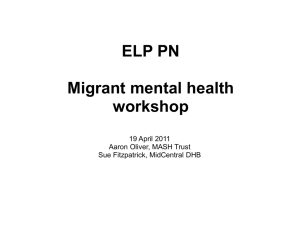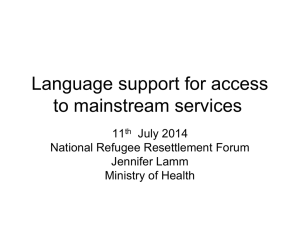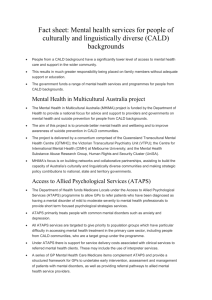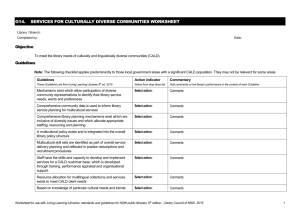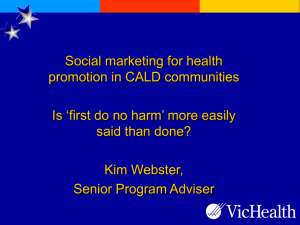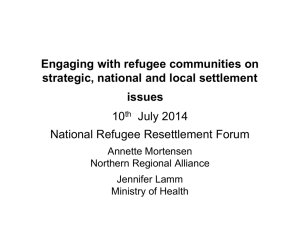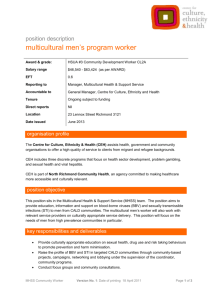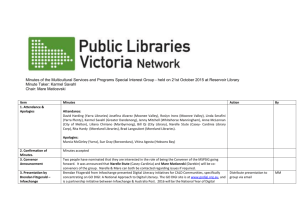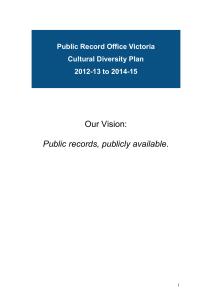Opening the School Gate - Department of Social Services
advertisement
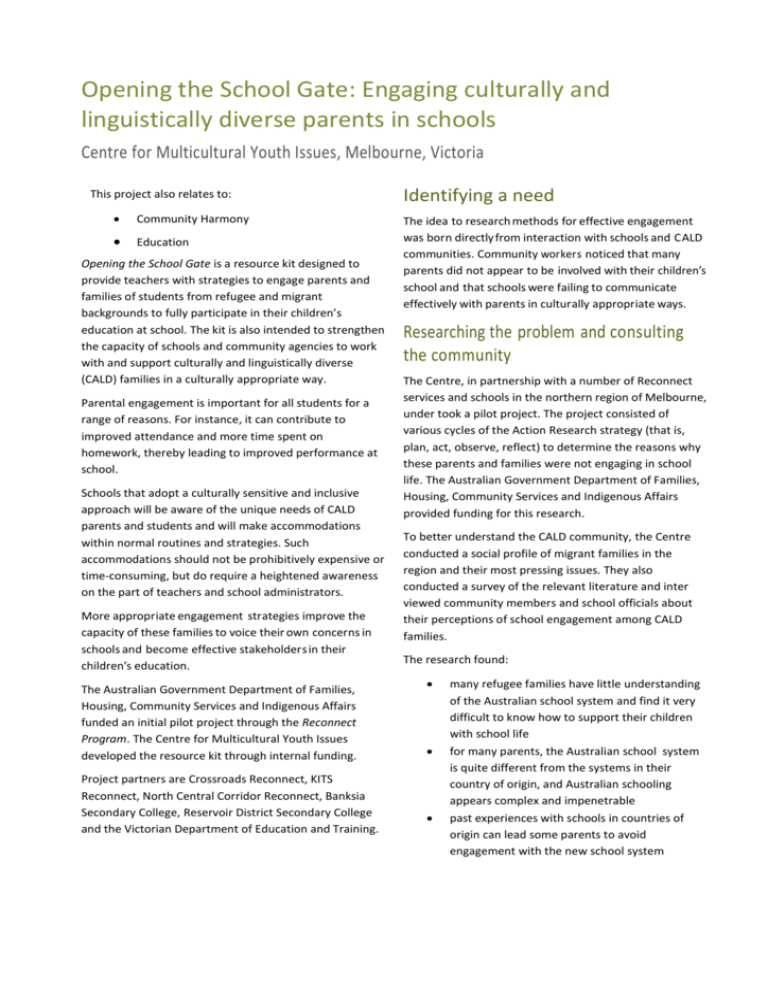
Opening the School Gate: Engaging culturally and linguistically diverse parents in schools Centre for Multicultural Youth Issues, Melbourne, Victoria This project also relates to: Community Harmony Education Opening the School Gate is a resource kit designed to provide teachers with strategies to engage parents and families of students from refugee and migrant backgrounds to fully participate in their children’s education at school. The kit is also intended to strengthen the capacity of schools and community agencies to work with and support culturally and linguistically diverse (CALD) families in a culturally appropriate way. Parental engagement is important for all students for a range of reasons. For instance, it can contribute to improved attendance and more time spent on homework, thereby leading to improved performance at school. Schools that adopt a culturally sensitive and inclusive approach will be aware of the unique needs of CALD parents and students and will make accommodations within normal routines and strategies. Such accommodations should not be prohibitively expensive or time-consuming, but do require a heightened awareness on the part of teachers and school administrators. More appropriate engagement strategies improve the capacity of these families to voice their own concerns in schools and become effective stakeholders in their children’s education. The Australian Government Department of Families, Housing, Community Services and Indigenous Affairs funded an initial pilot project through the Reconnect Program. The Centre for Multicultural Youth Issues developed the resource kit through internal funding. Project partners are Crossroads Reconnect, KITS Reconnect, North Central Corridor Reconnect, Banksia Secondary College, Reservoir District Secondary College and the Victorian Department of Education and Training. Identifying a need The idea to research methods for effective engagement was born directly from interaction with schools and CALD communities. Community workers noticed that many parents did not appear to be involved with their children’s school and that schools were failing to communicate effectively with parents in culturally appropriate ways. Researching the problem and consulting the community The Centre, in partnership with a number of Reconnect services and schools in the northern region of Melbourne, under took a pilot project. The project consisted of various cycles of the Action Research strategy (that is, plan, act, observe, reflect) to determine the reasons why these parents and families were not engaging in school life. The Australian Government Department of Families, Housing, Community Services and Indigenous Affairs provided funding for this research. To better understand the CALD community, the Centre conducted a social profile of migrant families in the region and their most pressing issues. They also conducted a survey of the relevant literature and inter viewed community members and school officials about their perceptions of school engagement among CALD families. The research found: many refugee families have little understanding of the Australian school system and find it very difficult to know how to support their children with school life for many parents, the Australian school system is quite different from the systems in their country of origin, and Australian schooling appears complex and impenetrable past experiences with schools in countries of origin can lead some parents to avoid engagement with the new school system (some parents may be used to a more strict separation between home and school life, where parents are only contacted in relation to a crisis or a discipline issue). The disconnection between home and school can be a source of tension within refugee and migrant families. Centre for Multicultural Youth Issues Senior Policy Officer, Louise Olliff, said: When parents aren’t able to communicate with the schools, they don’t know what’s going on with their young people. It can create divisions and a power imbalance between young people and their parents. Researching effective solutions As a second part of the pilot project, Reconnect youth and family workers from the Centre researched the most effective strategies for engaging CALD parents with schools by using Action Research strategies and recording the results. It began by focusing on the question: What would it take to promote good practice in engaging culturally and linguistically diverse parents with schools? The Centre’s community workers then helped staff at two local schools to plan and hold parent conferences using interpreters in primary and secondary schools, and send information to parents. After observing and reflecting on their hypotheses in these real life settings, they thoroughly explored the issues around engaging CALD parents in schools and recorded the results. The Centre also consulted Islamic schools and Samoan and Somali communities for guidance and information. In conducting the research, workers found that: there is a lack of demographic data on diversity within schools bilingual community workers can be important facilitators in connecting parents and schools there is a great disparity between schools’ and parents’ expectations of what a parent– school relationship should look like. As a result of the research, the Centre found successful engagement with schools and community agencies involved: the creation of working partnerships between schools and culturally and linguistically diverse families thinking from the families’ perspective directly addressing barriers to family involvement creating a variety of opportunities for parents to become involved in school life and decision making. Schools that had the best relationships with refugee and migrant families were those that had already incorporated some culturally appropriate techniques into their standard practices. Where such approaches were not adopted, schools were actually a real source of disempowerment for families. In order to adequately address the needs of culturally and linguistically diverse families, schools need to take a structured, holistic approach. Schools that haphazardly encourage participation through one-off events are unlikely to demonstrate a genuine interest in parental engagement and are thus unlikely to sustain involvement. Producing the guide The successes and challenges of the engagement strategies trialled through the pilot project, along with the previous research, were used to compile a written guide for engaging CALD families in schools. The Centre funded production of the guide, titled Opening the School Gate: Engaging CLD Parents in Schools, and encourages schools throughout Australia to make use of it. The guide contains detailed information on engaging CALD families under the following topics: planning for greater CALD engagement in your school planning a CALD parents’ meeting running an effective meeting with CALD parents supporting CALD parents in your school. Each topic is explored in detail. An explanation is provided about the special needs of CALD communities and the importance of getting it right, and strategic options are provided. The guide makes suggestions about planning a CALD parents’ meeting on a wide range of matters including the format of the meeting, setting the agenda, seeking parent and student input and arranging childcare, transport, and providing translated information and interpreters for parents. Schools cite resource and funding limitations as a barrier to implementing programs that would best engage with culturally and linguistically diverse families. However, by developing partnerships with community organisations and accessing free interpreter services, cost effective strategies can be used. When inviting families to the meeting, schools are advised not to rely only on a written notice. They should follow up with a telephone call a week or two before the meeting in the parent’s first language. This approach is important because: Engaging with CALD families in a culturally appropriate way should be a reflection of the committed approach of the school to student wellbeing and its philosophy of inclusiveness. parents/guardians may be competent speaking their own language but may not be literate in that language parents/guardians will realise that the school is making an effort and recognises their language needs if they are contacted in their first language many communities are largely oral communicators the fear many parents/guardians associate with attending school meetings may be alleviated if they have spoken to someone personally, they understand what the meeting is about, and can ask questions. Achievements The good practice guide that has been created for working with CALD families is an important resource for schools throughout Australia. The research project found that many schools with migrant and refugee populations have not under taken any strategies for working with CALD parents and have little communication with parents. Through the tools and suggestions it contains, the guide helps schools to take simple yet meaningful steps towards engaging CALD families and creating opportunities for CALD parents and guardians to voice their concerns and actively participate in their child’s school. Challenges Many schools and teachers feel too overwhelmed with normal educational activities to implement new strategies to accommodate CALD students and their families. This is especially the case in schools with small migrant or refugee populations that are easily overlooked. Key messages and advice for setting up a similar project The Centre for Multicultural Youth Issues has the following advice for those considering implementing something similar : consult widely with schools, parents, students and other stakeholders when trying to gather information about engagement make use of the Action Research strategy be sure to have a strong base in both research and practice be open to reformulating ideas based on observations and lessons learnt be flexible and be prepared to modify your approach when needed (more established communities may be easier to engage than small and emerging communities) schools need to work with state and local government so that policy makers understand the significance of active, engaged culturally and linguistically diverse families and the positive impact they can have on the community at large to bring about lasting change. Opening the School Gate: Engaging CLD Parents in Schools can be obtained free for download at www.cmyi.net.au/ResourcesfortheSector#TrainingAndRe source. Contact details Centre for Multicultural Youth Issues 304 Drummond St Carlton Victoria 3053 Phone: 03 9340 3700 Fax: 03 9349 3766 Email: info@cmyi.net.au Website: www.cmyi.net.au
